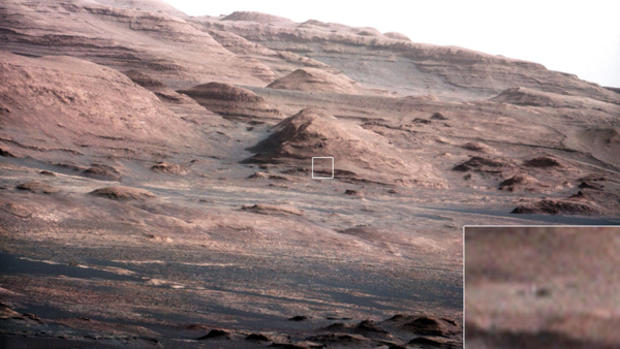NASA crosses fingers that Mars rover won't find water
(CBS News) It's not often one sees scientists hoping not to discover something. That is doubly true for the team behind Mars rover Curiosity, NASA's ambitious 1-ton science lab currently on the surface of the Red Planet. But scientists are crossing their fingers that the rover does not discover what might seem to be a big find on Mars: water. The reason? Planetary pollution.
One of Curiosity's missions is to search for evidence of life on Mars. The rover comes equipped with a drill to dig into Martian rock and hopefully unearth signs of ancient life. But that same drill is the reason NASA hopes the rover never hits water. The fear is that microbes from Earth may still cling to the drill and could potentially survive in Martian water, thus contaminating the planet.
Initial plans for Mars rover Curiosity were to have all parts of the robot sterilized and sealed prior to launch to ensure that this exact scenario would not happen. Drill bits for Curiosity's robotic arm were to be locked in a box to be opened only after the rover landed on Mars. But engineers grew concerned that the drill bits might be damaged in landing, and removed one of the drill bits from storage to attach to the rover, resulting in Earthly microbes attaching to its surface.
Speaking with the Los Angeles Times, NASA Planetary Protection Officer Catharine Conley said that the decision to attach a drill bit on Earth went against NASA protocol.
"They shouldn't have done it without telling me," Conley told the newspaper. "It is not responsible for us not to follow our own rules."
While it may seem unlikely for Earthly organisms to survive the interplanetary trip to Mars, scientists estimate that as many as 250,000 bacterial spores may have survived the journey. The harsh environment of Mars - freezing temperatures, searing ultraviolet radiation and an atmosphere of primarily carbon dioxide - would be enough to deal with the majority of organisms attached to the rover, but not all. Scientists have long known that certain Earth organisms are capable of surviving such inhospitable conditions.
NASA's plan for now is to avoid any contact with ice or water on the surface. This is one of many reasons Mars' Gale Crater was chosen as the landing spot for Curiosity. Among its many geological features, the crater is extremely dry.
If Curiosity does encounter Martian water, NASA will most likely play it better safe than sorry.
Former Planetary Protection Officer John D. Rummel told the Los Angeles Times, "It will be a sad day for NASA if they do detect ice or water. That's because the Curiosity project will most likely be told, 'Gee, that's nice. Now turn around.'"
